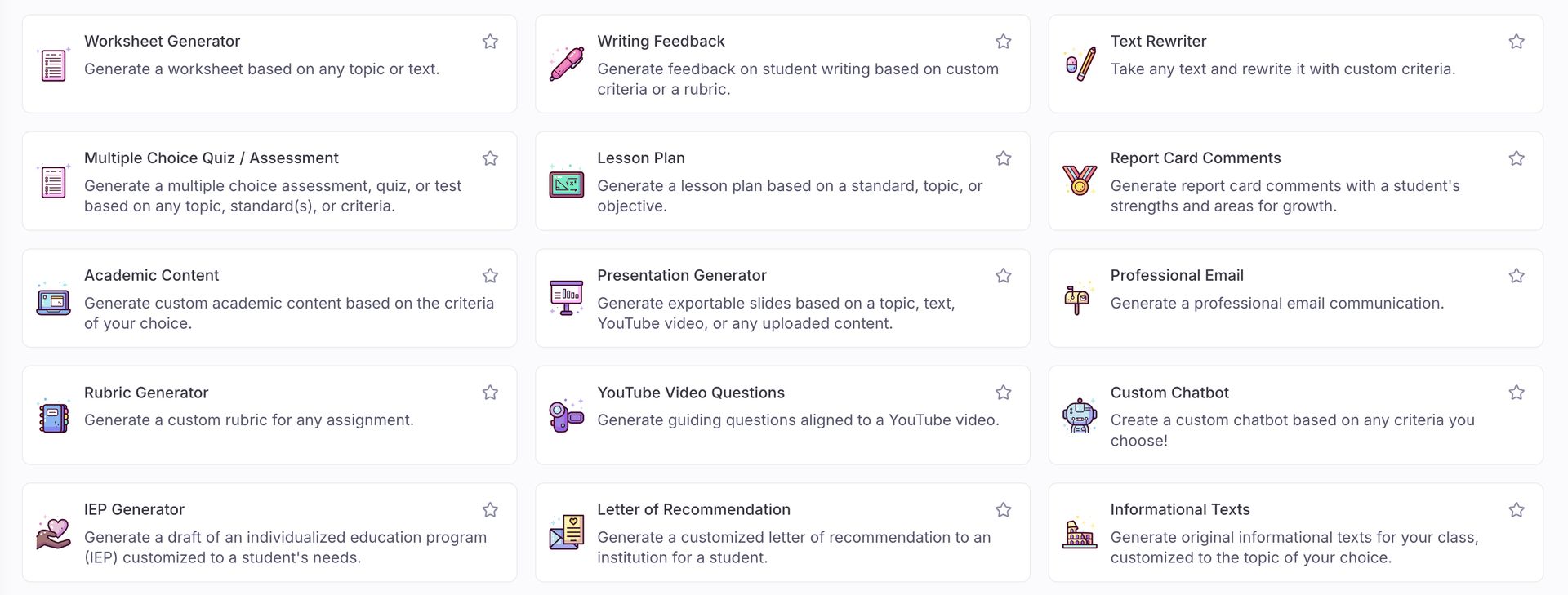Welcome to Chalkbeat Ideas, a section and newsletter featuring reported columns on the big ideas and debates shaping American schools. Join us next week for our first virtual event, where we’ll unpack new data on learning loss and recovery with Emily Oster. If you know someone who might appreciate this newsletter, forward it to them: They can sign up for it here.
Adeel Khan was a former principal looking for his next act. It was late 2022 and ChatGPT had just been released. As he began to tinker with it, Khan had a revelation: Artificial intelligence could make teachers’ jobs dramatically easier. He decided to launch a company, MagicSchool, to help teachers harness the technology.
Today, MagicSchool is one of the most popular AI tools used by teachers. It offers a user-friendly interface where teachers can create worksheets, give students feedback on their writing, and create classroom presentations. The tool is powered by ChatGPT and Claude, another major AI model.
MagicSchool has raised $60 million from investors and has a staff of 160. The company also has 20,000 schools that pay for the premium product. A basic version is free.
Khan says that 3.5 million U.S. educators have signed up to use MagicSchool, though he acknowledges that’s an overestimate of its true user base. In October, about 700,000 teachers in the U.S. actively used MagicSchool, he said. (There are about 4 million teachers in the country.)

Adeel Khan, creator of MagicSchool. (Courtesy of Adeel Khan)
I wanted to speak to Khan because his company is at the leading edge of the AI-inspired shifts in American education. I was curious whether he shared concerns about students, and even teachers, offloading their thinking to the technology. His answer was yes, somewhat to my surprise. We also discussed whether it’s appropriate to use AI to write special education plans. And he responded to the concern that AI struggles with math, which was apparent when I tested out MagicSchool.
When we spoke over Zoom recently, Khan — who started his career as a teacher and worked as an administrator for several years at a charter school network in Denver — wore a purple company hat with the company’s motto: “Teachers are magic.”
Our interview has been edited for clarity and length.
MagicSchool has a tool to generate individualized education programs, IEPs. Do you think AI should be writing such important sensitive legal documents?
I would actually argue that there's nothing the AI can do better than that: taking your really deep knowledge and then making it into the formatted document. Because of the nature of IEPs being so fraught, we have a lot of schools and districts that are not quite comfortable with this, and they turn this tool off. I respect everyone's decision.
But on a personal level, I think that this is an incredible use case. Special education teachers are the most overburdened teachers in a school building. And I think this is a lifeline to them, and they deserve tools like this to help them with the paperwork — because that's what this is. It's just the paperwork. It's not the actual knowledge of the student, it's not the plan. I think that teachers who use the IEP generator are serving their students better than teachers who are not.
We sometimes talk about the risk of AI for students of “cognitive offloading.” Do you worry about cognitive offloading for teachers?
Yeah, I do worry about it. I think that the teacher's expertise is really, really important. Every one of the tools, including the lesson plan generator, prompts the teacher before they get an output to do the thinking first. What standards are you going to use? What context about your students can you give? In our professional developments, we remind teachers they are still in charge.

A screengrab of MagicSchool AI
Do you think AI can actually be an effective tutor of students?
In some sense no, in some sense yes. I don't think that putting a YouTube video that teaches students in front of them and then a ChatGPT on top of that is going to teach students instead of a teacher. There are a lot of people who'd like for you to believe that.
But if you think of a form of tutoring as the teacher having a cognitive extension of themselves to help support the child, I do think that there are really powerful use cases.
I use the example of the writing feedback tools. Teachers create the tool, they attach the rubric.
The students write the essay completely on their own without AI assisting — I don't believe in that. I was an English teacher. I think writing is the construction of thought. But after they're done writing, they get feedback [from AI]. It says areas of strength, areas of growth. Then the student can even ask more questions about how they can improve their essay.
I was trying out the student-facing tutor. It walked me through the Pythagorean theorem completely correctly, but it accepted the wrong answer for the square root of 120.
I would love to learn more about that. We have an evaluations team to jump on that and try to understand how that math went wrong. Math has gotten dramatically better in the platform.
[After our conversation, I tried MagicSchool again and it again accepted the wrong answer for the square root of 120, which is 10.95, not 11.96. In a follow-up note, Khan emphasized that MagicSchool warns users that its math computations are not reliable.]

A screengrab of MagicSchool’s response to my wrong incorrect answer
At a recent ed-tech conference that you and I were both at, there was one person who said that right now the impact of AI on schools is a net negative. Do you agree with that?
I think I agree with that more than I disagree. It's easy to take a shortcut, and generative AI makes it even easier. I also think that we have a long way to go as a system to teach students about responsible AI usage.
One of my close friends here in Colorado, he has a daughter who's in 10th grade. Her dad mentions I started a company. I said, "It's called MagicSchool. Have you heard of it?” And she's like, "Yeah, we use it in school; it's really helped me improve my writing.”
And then, of course, I ask her the next question: “What's going on with AI outside of MagicSchool?” She said, “Kids are using it to cheat. But I've actually made the choice to use it really sparingly, because I know my brain's in this really important moment of cognitive development.”
What an amazing teacher and school she must have to give her the kind of information to make her own choices about how she's going to use technology.
The alternative point of view is that actually schools need to be more paternalistic and protective of tools that 16-year-olds may not appreciate the long-term harms of.
I think that if there was no use case in that education, that's fair. But do I see a really meaningful use case in education for generative AI? Absolutely.
Reach me at [email protected].
How was today’s newsletter? Take 2 minutes to let us know.
Looking for your next read? Check out these other great newsletters.



